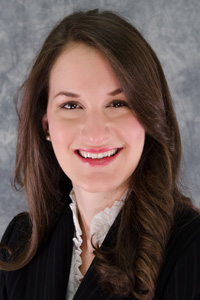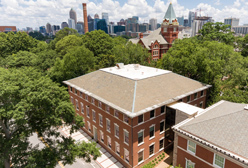New Sponsored Research
The MacArthur Foundation has awarded Michael Best, associate professor in The Sam Nunn School of International Affairs, $300,000 for the project called "Nigeria Innovation Network: Empowering Youth, Social Media and Civic Engagement."
Recent Books by Faculty
Angels and You Dogs (PS Publishing) by Kathleen Goonan, professor of the practice, School of Literature, Media, and Communication is a collection of short stories from the science fiction author who is known for exploring nanotechnology.
Nightmare: From Literary Experiments to Popular Culture (Brill) by Dina Khapaeva, professor and chair of the School of Modern Languages. This book examines the prose of classic authors to reveal the unstudied features of the nightmare as a mental state and traces the mosaic of coincidences leading from literary experiments to today’s culture of nightmare consumption.
What Does Georgia Tech Think?
Selected Press for Ivan Allen College of Liberal Arts
|
Utz on English Studies
"The English professoriate should embrace, accompany critically, and shape the new discourses its students sorely need to communicate and compete: blogs, video essays, Web comics, digital archives, data visualization, and the like. If these professors continue to hide in disciplinary dead-wall reveries, preferring not to grow with the academic culture and technological change that surround them, I predict students will vote with their feet, and parents with their pocketbooks, to usher in the end of degree programs and departments that rely exclusively on writing, print, and the allegedly carefree days of WordPerfect 6.0," wrote Richard Utz, chair of the School of Literature, Media, and Communication in his opinion piece, "The Trouble with English." Source: Chronicle of Higher Education, January 2, 2013
January 31, 2013
11:00 am
February 12, 2013
12:00 pm
February 12, 2013
12:00 pm
February 13, 2013
2:00 pm
February 15, 2013
2:00 pm
February 18, 2013
4:30 pm
February 21, 2013
3:30 pm
February 22, 2013
8:00 pm
February 25, 2013
4:00 pm
February 28, 2013
12:00 pm
February 28, 2013
2:00 pm
February 28, 2013
7:00 pm
February 28, 2013
7:00 pm
|
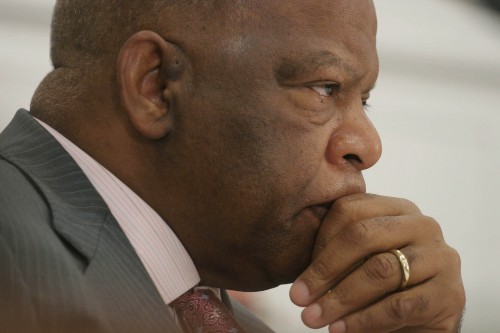
|
John Lewis to Receive Ivan Allen Jr. Prize for Social Courage
Congressman John Lewis – an icon of American civil rights – has been named a recipient of the Ivan Allen Jr. Prize for Social Courage. Lewis will be honored during the Allen Prize Symposium: "Building Communities of Trust" and an award luncheon at the Ivan Allen College of Liberal Arts on April 4.
“John Lewis put his life on the line for many years during the 1960s to bring about equality under the law for all Americans. His unflinching civil rights leadership and ongoing advocacy for social change throughout his career have elevated the causes of human rights around the world,” said Peterson. “It is our privilege to honor the life and work of Congressman Lewis through the Ivan Allen Jr. Prize for Social Courage.”
Lewis became known around the world at the age of 25 when he called on President Lyndon Johnson for federal intervention following a brutal attack on peaceful protesters by law enforcement near Selma, Alabama. Lewis’s appeal on that “Bloody Sunday,” March 7, 1965, turned public opinion against those trying to maintain the old social order of the South and moved President Johnson two days later to present to Congress what would become the Voting Rights Act.
“Congressman Lewis is one among us who has had the discipline and tenacity to stand tall, even in the face of physical danger, and he continues the struggle to change the world and make it a better place. His courage in the non-violent movement for civil rights and his ongoing work to build communities of trust provide both a watermark and a signpost in the quest for human rights and human dignity in our world,” said Jacqueline J. Royster, dean of the Ivan Allen College of Liberal Arts.
Lewis was one of the “Big Six” leaders of the Civil Rights Movement. He is the last surviving keynote speaker from the 1963 March on Washington, of which he was a core architect. Lewis’ impact on civil rights for African-Americans included advocating desegregation laws and voters’ rights. A founding member and president of the Student Nonviolent Coordinating Committee (SNCC), Lewis planned and led many of their activities. His personal courage was first evident when he led student sit-ins that resulted in the public accommodation of African-Americans at Nashville restaurants. He was one of the original 13 Freedom Riders who challenged legally sanctioned segregation on interstate buses. Despite repeated attacks on his dignity, physical beatings and arrests, Lewis remained staunchly committed to nonviolent work for social change.
Lewis was elected a U.S. Congressman from Georgia in 1986 and represents the state’s Fifth Congressional District including Atlanta and parts of four surrounding counties. He has remained an outspoken advocate for domestic and international social and human rights issues. As recently as 2009, he was arrested at the embassy of Sudan, where he was protesting the obstruction of aid to refugees in Darfur.
The Ivan Allen Jr. Prize for Social Courage recognizes individuals such as Lewis who, by standing up for clear moral principles in the social arena, have positively affected public discourse at the risk of their own careers, livelihoods and even their lives. The Prize is endowed in perpetuity by the Wilbur and Hilda Glenn Family Foundation.
More information on the Allen Prize can be found at the following link: http://ivanallenprize.gatech.edu.
|
Founder's Day Program Evolves for 2013
Save the date for the Ivan Allen College of Liberal Arts Founder's Day celebration on March 13.
This year marks the 50th anniversary of landmark acts of social courage in the arena of civil rights that forever changed the face of America and the world. We will remember those extraordinary actions by Americans ranging from Presidents Lincoln, Kennedy, and Johnson, to the courageous leaders of the civil rights movement including Martin Luther King, Jr. and Allen Prize recipient, Congressman John Lewis. The college's founding namesake, former Atlanta Mayor Ivan Allen, Jr., was one of those who stood up for civil rights. We will remember his courageous testimony before Congress on behalf of what became the Civil Rights Act of 1964. The program "From Witness to Action” will celebrate the many individuals who put their lives on the line in 1963 to advance equality for all Americans and will highlight work by our own faculty and students to advance social justice. Faculty, staff, students, alumni, and friends of the college are invited to attend.
- 9:00 am – 12:00 pm – A Research Roundtable on Social Justice will present student and faculty research-based dialogs. Location: Gordy Room in the Wardlaw Building.
- 1:30 pm - 3:00 pm – Hall Building Ribbon Cutting Ceremony will showcase the newly renovated building and the Writing & Communication program that is housed there. Location: 215 Bobby Dodd Way.
- 3:30 pm - 5:00 pm - Founder's Day Program & Legacy Awards will feature a performance by DramaTech and a keynote speaker.
- 5:00 pm - 6:00 pm - Founder's Day Reception will be held in the Gordy Room in the Wardlaw Building.
Founder's Day invitations to the IAC community will be forthcoming.
|
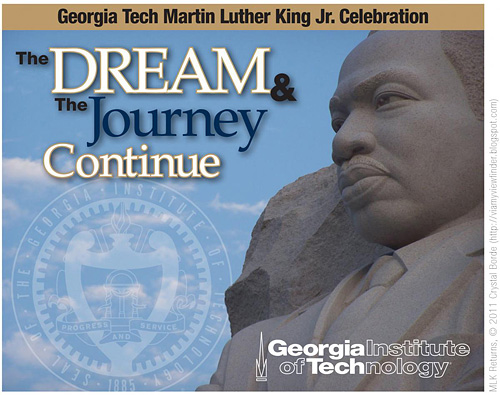
|
Strengths of Georgia Tech are Key to Achieving MLK Dream
Dean Royster authored a guest commentary for the Technique (Georgia Tech's student newspaper) about the relevance of the work and dream of Martin Luther King, Jr. which were celebrated during events on campus in January.
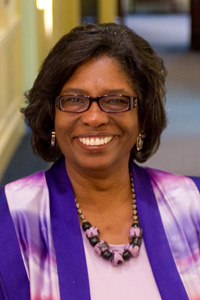 Tech has designated January 10-26 as the period for honoring the life and legacy of Dr. Martin Luther King, Jr. with an interesting array of activities and collaborations. In doing so, we invite bold reflection among our community—and raise the challenge of how and why both the dream and the journey must continue. Tech has designated January 10-26 as the period for honoring the life and legacy of Dr. Martin Luther King, Jr. with an interesting array of activities and collaborations. In doing so, we invite bold reflection among our community—and raise the challenge of how and why both the dream and the journey must continue.
In calling for the dream to continue, we underscore a long-standing hope for both leaders and followers who hold a vision of possibility for the world that is both human-centered and humane. We acknowledge an equally long-standing reality that engendering such a vision often requires inordinate courage and compassion. We draw attention to the fact that a basic challenge for people—even, and perhaps especially, those of good conscience and goodwill—is finding the nerve or learning to see, that it’s not so much that the world just needs love.
Having loving hearts and souls may indeed constitute an important common good these days, but what we may actually need a bit more of than just love is for much larger numbers of people to develop a much deeper capacity to dream of a world: where freedom, peace and justice reign supreme; where it is normal to embrace—with deep breaths, rather than shallow ones—the concepts of social responsibility and ethical action; where we applaud in wide-eyed wonder the absolute marvel of the potential of all human beings, not just some of us, and where we see clearly the absolute need for all available potential to function to the best of its ability; where human dignity has a secure value in all of our places under the sun; and where we have the good sense to preserve our little blue planet—as the only place we call home—and have even better sense to proclaim this planet as a place for courtesy and caring, for grace and respect—not just for ourselves but, in the deepest recesses of our compassion and courage, for others as well.
During this period of bold and, yes, dramatic reflection, we call for this dream, this hope, this expectation to continue—quite frankly because we remain literally haunted by the need in the world for such visionary dreaming in order to address thoroughly and well the truly thorny challenges that surround us.
The cautionary tale, of course, is that the one truth that we do not have the privilege of escaping is that we still have a very long way to go before we can call either the dream or the journey—whether we are thinking in local or global terms—over.
So, at Tech what do we do about the need to continue? An obvious answer is embedded in who we are as a university community. Note, if you will, that at Tech we take considerable pride in being smart, hardworking, entrepreneurial, innovative and incredibly effective problem-solvers. What we can do, then, is take on this set of problems. The dream that one man dreamed of well over 40 years ago, a dream so many others around the globe shared and continue to share with him, has not been realized just yet, but with all of the strengths those of us at Tech take such pride in, we, too, can dream a better world than the one we live in today.
Furthermore, we can take the opportunity of this annual ritual of the Martin Luther King Jr. holiday to rededicate ourselves to the task of living up to the potential that we know we have, personally and institutionally.
I dare say that in honoring the life and legacy of Dr. King, what we more realistically have the opportunity to honor is not just him and his accomplishments, but also our own obligations to put ourselves to the test.
Do we have enough imagination to dream better worlds? Do we have the courage and compassion to endow our dreams with a human and humane sensibility? Can we bring truth to the power of our best dreams? Most of all, can we dedicate ourselves to the hard work, as Dr. King did, of making our most ambitious dreams for a better world come true? Indeed, I may be a “dreamer,” but, in keeping with a powerful legacy, I sincerely believe that we can do what we need to do and what we must do.
View the piece on Technique here.
|
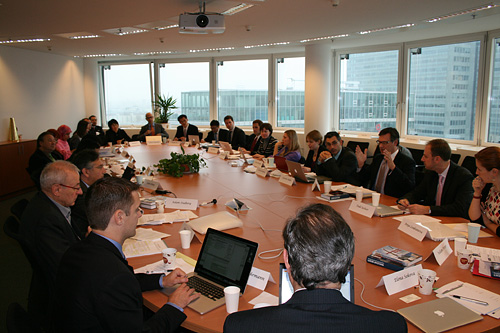
|
POSSE Convenes World Scholars in Vienna to Discuss Nuclear Nonproliferation
The Project on Strategic Stability Evaluation (POSSE) brought together scholars from around the world in November for its annual meeting at the Vienna Center for Disarmament and Non-Proliferation (VCDNP) in Austria. Funded by the Carnegie Foundation of New York, POSSE is revitalizing academic policy debate on nuclear disarmament with a goal of moving beyond the concepts inherited from the cold war.
Led by Associate Professor Adam Stulberg in The Sam Nunn School of International Affairs, POSSE is also working to build a global network of young scholars. Advanced graduate students and young professors from the United States, Russia, China, India, Pakistan, Israel, and France are analyzing frameworks and methodologies for re-thinking the requirements for strategic stability amid deep reduction in standing nuclear arsenals.
Papers drafted by POSSE scholars for the November workshop will be finalized on February 1 after critique by senior reviewers including Patrick James, University of Southern Carolina; Alexey Fenenko, Institute of International Security Studies of Russian Academy of Sciences; Jeffrey Lewis, Center for Nonproliferation Studies, Monterey Institute of International Studies; and Heinz Gärtner, Austrian Institute for International Affairs.
For its April meeting, POSSE is sponsoring a roundtable and panel at the International Studies Association conference to be held in San Francisco.
Related Links:
|

|
Study Reveals the Unaccounted Economic Role of Arts Districts
(Photo courtesy Wally Gobetz.)
Georgia Tech researchers have released a study investigating how cultural arts districts impact local economies. Findings indicate that cultural districts boost the rate of arts patenting, steadily enhancing art development within communities over time. The research will be published in a book this spring.
In 2006 the presence of an arts district led to five additional arts patents granted per city among the study’s sample set of 148 cities. Between 1999 to 2006, the arts patent rate for cities with cultural districts was two percentage points higher than those granted to cities without a central cultural hub. This is significant considering the overall average patent rate was 0.6%.
“Arts districts are associated with higher shares of media arts patenting in 2006 and also with faster growth rates in the share of patenting that goes to media arts,” says study author Shiri Breznitz, assistant professor in the School of Public Policy within the Ivan Allen College of Liberal Arts, and co-author Douglas Noonan, a former associate professor on the school who now works at Indiana University. “It appears that arts districts promote innovation in media arts in particular.”
Media arts were specifically studied due to the booming industry’s strong relationships to both arts and university research that spans many forms of expression (i.e. digital games, movies, television, music, and web entertainment.) The rapid growth of this industry portends its new role in shaping economies.
“How new media arts combines truly artistic and creative content with emergent and novel technologies – the staple of most innovation studies – offers a fascinating intersection between arts and technology and an area with seemingly greater potential for economic impact and innovation for universities,” says Breznitz.
Arts districts in place since the late 1990s had a positive impact on employment in arts and media arts in their respective cities by 2006. They increased industry job shares by as much as one-fifth more than the average 2.5% growth rate. By 2011, however, that impact subsided.
The most reliable source of rising arts employment since 1999 comes with research extensive (R1) universities. These universities increased media arts employment trends by one-third more than the average 1% growth rate, specifically in the broader urban area outside of the core city zone.
“The impact of R1 universities implies that artists do not live in the same city as the R1 university and hence suggest a need to evaluate the relationships between the geographical location of the R1 university and employed artists,” says Breznitz.
Knowledge spillover among universities into the surrounding region is well-acknowledged, but historically focuses on technical and scientific R&D efforts. The study expands the focus to include the role of the arts industry in economic growth among institutions generating public investment, specifically cultural districts and R1 universities. The result is a synergistic interchange between the two institutions to promote employment and innovation among the media arts throughout the greater community.
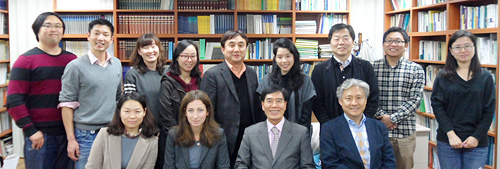
Noonan presented the pair’s findings at a Brookings Institution/National Endowment for the Arts panel in May, 2012. Breznitz presented the study at the National University of Seoul, South Korea, in November (Breznitz is picture above, front row, second from left, with the cohort at Seoul). Findings will be published as a chapter in a book called Creative Communities: Art Works in Economic Development (Brookings Institution Press) that will be released in the spring of 2013.
Related Links
|
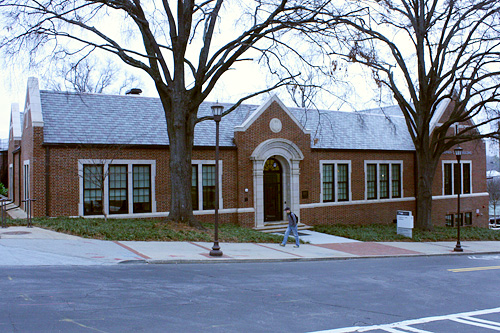
|
Renovated Hall Building Open for Business
Monday, January 7, marked not only the beginning of the 2013 spring semester, but also the official opening of the Stephen C. Hall building, a newly renovated teaching and research facility on the corner of Fowler Drive and Bobby Dodd Way.
Formerly the Navy ROTC building, the Hall Building is the new home of Georgia Tech's Writing and Communication program, which is housed in the School of Literature, Media, and Communication. The building has two specially outfitted multimedia classrooms, a formal presentation space, a seminar room, a recording booth, multiple collaborative spaces, and a lounge for mothers. There is office space for program directors and interns as well as for sixteen of the Brittain Fellows who teach in the program. The building also houses the newly restructured DevLab, complete with six high-end computer workstations and a collaborative space. A patio, which faces Bobby Dodd Stadium, will be used for events and will no doubt prove to be prime real estate on game days.
The Brittain Fellows currently teach thirteen different sections of ENGLISH 1102 in the Hall Building, as well as, two sections of Technical Communication (LMC 3403). Other classes include Andy Frazee’s course on Poetry and Digital Culture (LMC 3843) and Program Director Rebecca Burnett’s course on Communicating Science and Technology (LMC 3412). On Wednesday evenings at 5:00pm, Vinicius Navarro is holding film screenings for his classes on Film History (LMC 3254 G) and Global Cinema (LMC 3257 L) in Hall 102.
A ribbon-cutting and building tours including a showcase of the Writing and Communication program will be part of the college's Founder's Day activities on March 13.
|
Sharp Announced as Assistant Vice Provost at Georgia Tech
Leslie Sharp, an alumna of IAC master’s and doctoral programs, has stepped into the role of the Assistant Vice Provost for Graduate Education and Faculty Affairs for Georgia Tech.
Sharp has served as the assistant dean for Academic Affairs and Outreach in the College of Architecture since 2008. She received an M.S. in History of Technology in 2001 and a Ph.D. in History of Technology in 2004, both offered through the School of History, Technology, and Society. Her research focuses on exploring the impact of technology on people and places within the framework of historic preservation and gender.
|
Georgia Tech Guides the Future of Journalism; Liberal Arts Graduate Research to be Showcased at GTRIC
In the past decade, newspaper readers have been inundated with stories about how print journalism is dying. These stories are often written with a panicked tone and detail how there is no longer money to be made in the journalism business; and yet, they often fail to mention the increasing strides in quality and organization made in the digital realm. From content gathering to distribution models, online journalists are paving the way for an exciting new integration of old and new methods of presenting the news.
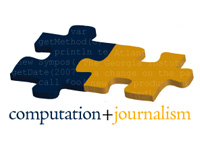 This emerging integration will be the focus at the second Computation + Journalism symposium, which runs from January 31 to February 1 at Georgia Tech. The symposium will bring together speakers from academia and journalism to discuss how computation has affected the world of news and its direction for the future. Topics will include how to incorporate big data into the process of journalism, new methods for distributing news, and the use of social media in news gathering. View details here. This emerging integration will be the focus at the second Computation + Journalism symposium, which runs from January 31 to February 1 at Georgia Tech. The symposium will bring together speakers from academia and journalism to discuss how computation has affected the world of news and its direction for the future. Topics will include how to incorporate big data into the process of journalism, new methods for distributing news, and the use of social media in news gathering. View details here.
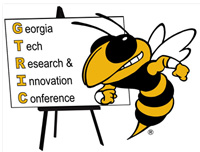 The Ivan Allen College Graduate Student Advisory Board has worked with the Georgia Tech Graduate Student Association to plan a conference as part of the upcoming Georgia Tech Research and Innovation Conference (GTRIC) on Tuesday, February 12, 2013 in the Student Center. Graduate students in our liberal arts disciplines wanted the option to present papers based on their research. Such presentations are the dominant mode of initially disseminating research in the humanities and social sciences, and graduate students will now be able to share and hear research from their peers in different Ivan Allen schools. The GTRIC poster display will be located in the ballroom, while the conference will run from 12:00pm to 6:00pm and take place in SC 301 and SC 319, third floor breakout rooms of the Student Center. In addition to viewing the posters, the Georgia Tech community is invited to attend the GTRIC graduate student presentations. At 7:00pm on February 12, 2013, Ivan Allen College will present prizes to the top three conference papers as part of the GTRIC awards ceremony, which will be held in the Ferst Center Theatre. A program for the Ivan Allen College of Liberal Arts GTRIC conference is available here. The Ivan Allen College Graduate Student Advisory Board has worked with the Georgia Tech Graduate Student Association to plan a conference as part of the upcoming Georgia Tech Research and Innovation Conference (GTRIC) on Tuesday, February 12, 2013 in the Student Center. Graduate students in our liberal arts disciplines wanted the option to present papers based on their research. Such presentations are the dominant mode of initially disseminating research in the humanities and social sciences, and graduate students will now be able to share and hear research from their peers in different Ivan Allen schools. The GTRIC poster display will be located in the ballroom, while the conference will run from 12:00pm to 6:00pm and take place in SC 301 and SC 319, third floor breakout rooms of the Student Center. In addition to viewing the posters, the Georgia Tech community is invited to attend the GTRIC graduate student presentations. At 7:00pm on February 12, 2013, Ivan Allen College will present prizes to the top three conference papers as part of the GTRIC awards ceremony, which will be held in the Ferst Center Theatre. A program for the Ivan Allen College of Liberal Arts GTRIC conference is available here.
|
Pearson Co-Authors National Academies Conference Report
Willie Pearson, professor in the School of History, Technology, and Society, has co-authored a National Academies conference report, "Blueprint for the Future: Framing the Issues of Women in Science in a Global Context."
"Blueprint" summarizes committee presentations from a workshop convened by the National Academies Committee on Women in Science, Engineering, and Medicine (CWSEM). The report summarizes work-to-date by a group of scholars and professionals examing the status of women in selected technical fields around the world. The report captures some of the evidentiary and epistemological challenges of collecting and analyzing data from many different countries and regions. Such challenges include cross-cultural differences, social/political/economic mechanisms impacting women's participation, and the inverse correlations between levels in the scientific and technical career hierarchy and the number of women in science.
|
Brown's Book Named Outstanding Academic Title by Choice Magazine
Choice: Current Reviews for Academic Libraries named Marilyn Brown’s book, Climate Change and Global Energy Security (MIT Press 2011), a 2012 Outstanding Academic Title in the category Science and Technology.
The book details assessments of the most advanced commercially available technologies for strengthening global energy security, mitigating the effects of climate change, and enhancing resilience through adaptation and geo-engineering. Brown, a professor in the School of Public Policy, co-authored the book with Benjamin Sovacool.
Choice is the premier source for reviews of academic books, electronic media, and Internet resources of interest to those in higher education. The publication reaches almost every undergraduate college and university library in the United States.
Related Links:
|
Bolter Publishes Cover Article in ACM Interactions
Jay Bolter’s article, “Media Studies, Mobile Augmented Reality, and Interaction Design,” graces the cover of the January-February issue of ACM Interactions. Bolter, a professor in the School of Literature, Media, and Communication, cowrote the piece with Maria Engberg and Blair MacIntyre, professor in the College of Computing.
The authors argue that an historical understanding of media can contribute to a new form of aesthetic design. They also discuss their work in Augmented Reality, a research field in which one view's the real-life environment with some form of digital enhancement.
Published bimonthly by the Association for Computing Machinery (ACM), Interactions is the largest educational and scientific computing society in the world, Interactions is the flagship magazine for the ACM's Special Interest Group on Computer-Human Interaction (SIGCHI).
Related Links:
|
Here a MOOC, There a MOOC: But Will It Work for Freshman Composition?
The first in a series of guest blog posts by LMC's Karen Head for the Chronicle of Education Wired Campus is already generating lively debate. Here is the text of the article.
The following is a guest post by Karen Head, an assistant professor in the Georgia Institute of Technology’s School of Literature, Media, and Communication, and director of the institute’s Communication Center. She joins us today and in the coming months to report on her group’s efforts to develop and offer a MOOC (massive open online course) in freshman composition.
January 24, 2013, 2:59 pm
By Karen Head
In November 2012, I was part of a team that was awarded a grant by the Bill & Melinda Gates Foundation to develop a MOOC for one of the most ubiquitous of university courses: freshman composition. Over the next five months, I will blog about our process. And I will try to address a central question surrounding the proliferation of massive open online courses. Many people argue that rising technologies could allow us to educate the world more efficiently. My question is, can we educate people more effectively?
I teach writing and direct a communication-tutoring center at the Georgia Institute of Technology. I’m also a writer. When I began teaching 15 years ago, I was one of the first instructors to volunteer to teach in a technology-augmented classroom. When online videoconferencing technology was introduced, I began holding office hours through that platform, and later did the same in Second Life. In short, I am no Luddite. However, I will admit to some reservations about whether a MOOC is the ideal platform for teaching writing. I have argued passionately for keeping composition classes small. Ultimately, I decided to pilot this MOOC because I am open to the possibilities, but I prefer to discover firsthand whether it works.
I cannot imagine doing this alone. I’m joined by Rebecca Burnett, director of our Writing and Communication Program and the project’s co-principal investigator; Richard Utz, chair of the School of Literature, Media, and Communication; a group of 11 postdoctoral teaching fellows; plus several specialists in assessment, IT, intellectual-property law, and videography.
There is a growing body of literature on the theoretical underpinnings of MOOCs, but it is harder to find material on the process of developing, facilitating, and assessing a massive open online course. We plan to roll out the six-week course later this spring. The prep, development of pilots, and video-taping will take place in February and March. Our group’s first meetings, held in recent weeks, have focused on teaching philosophy, division of labor, and a project timeline.
We quickly discovered that we must also negotiate with some unexpected outside constituencies. A representative from Coursera (the platform we must use) contacted recipients of the Gates MOOC grants asking all the recipients to form a collaborative led by a Coursera representative to discuss course design. While the explicit message was one of helpfulness, the implicit message felt intrusive and seemed more about Coursera’s desire to ensure a certain continuity of experience for its users. Since Coursera is a business, I can understand its desire for such consistency. However, ours is a nonprofit project. This creates an obvious tension.
While all university instructors are subject to certain parameters, like established regulations regarding curriculum, I have never had to concern myself with any kind of conformity of delivery. Even the Gates Foundation is involved in unexpected ways: Recently we received two days’ notice that we should join a Webinar conducted by Quality Matters, an organization that provides subscription-based quality-assurance plans for online education. The Webinar introduced the company’s program and course-assessment rubric—the same rubric, we learned, that the Gates Foundation would use in its assessment of the MOOC grants. This was news to us, and we remain unsure how this new assessment requirement might affect our work.
Even without outside intrusions, we struggle with new challenges, some anticipated, some not. How can we keep students engaged, especially when we do not have traditional contact with them? How can we recreate and encourage extra-classroom support mechanisms like study groups, office hours, or tutoring? How do we protect students’ privacy and intellectual property without the firewalls of closed learning platforms? How do we address plagiarism? And, of course, the biggest question of all: How do we evaluate writing assignments in a course with potentially thousands of enrolled students? Because this MOOC is being designed for an open audience and will not award course credit, it is impossible to know who might enroll, or how many.
For our team, the greatest challenge is finding a way to provide the necessary substantive feedback to a large number of students. When Daphne Koller, a cofounder of Coursera, visited Georgia Tech last fall, I asked in a public meeting if she thought her company’s platform was appropriate for teaching a writing course. She responded that while there were robo-grading programs capable of evaluating mechanical errors, she wasn’t sure you could teach style or more complex skills.
That made me think about the popular children’s toy “Farmer Says,” which was designed in the 1960s to help children learn the names and associated sounds of common animals. I learned about animal sounds from my “Farmer Says,” but when I was 8 years old, I was watching television with my father and commented that I’d never seen a real pig. Two weeks later he took me to the South Carolina State Fair. Somewhere beyond the basic content knowledge there was a need for something more—something that required a more personalized and involved approach.
Can our MOOC be efficient and effective? I’ll let you know.
Read posts on Wired Campus
|
Alumna of the First LMC Digital Media Master's Class Comes Full Circle
Peering into the face of a 2,000-year-old mummy, Alison Nichols jump-started her future.
It was 1993, during the sticky Atlanta summer. Nichols was recently divorced. She had three young children, a degree in philosophy, and no desire to return to her past career as an insurance adjuster.
“I really was thinking, ‘I’ve got to go to work. What am I going to do?’“ recalled Nichols, sitting at her desk in the School of Literature, Media, and Communication’s Digital Media office.
Nichols noticed a news article about computer kiosks at the William C. Carlos museum at Emory University. It discussed the ability to digitally unwrap a mummy “and compare mummies with those in museums around the world,” she explained.
Kiosks, which are computer terminals offering location-specific information to users, are now commonplace in hotel lobbies, airports, malls, and museums, but they were a novel idea at the time. Nichols packed up her kids and took a trip to the museum, but when they arrived, there were no kiosks to be seen. Nichols was told she had misread the article, which had actually discussed the future of museum kiosks.
In talking with the director of education at the museum, Nichols was encouraged to apply to a new master’s program that was launching at Georgia Tech that fall: Information Design and Technology (IDT, now Digital Media.) The landmark degree was Nichols’ best opportunity to get the needed training to create a kiosk for the museum.
“Are you crazy?” Nichols thought at the time. “I’m not mathy. I’m not an engineer. My degree is in philosophy.”
But there was no denying that mummy. At the last minute, mere weeks before the first IDT class, Nichols made a late application to the program and made a personal plea to faculty Kenneth Knoespel and Pete McGuire. They agreed to accept her application.
Nichols started a new life as a graduate student in a program she says was ahead of its time.
“I just find it amazing that the professors who put the program together had the awareness they did,” said Nichols. They had invested months of advance planning and forethought at a time when many people thought the World Wide Web was just a phase.
For Nichols, the technology was transformational. She spent her time figuring out how information would display on the kiosk computer screen for the Carlos Museum. There were no tools or methods at that time for interaction design, so the team made it up as they went along. Nichols drew screens on a whiteboard and used Post-it Notes, blueprinting each screen for programmers to build.
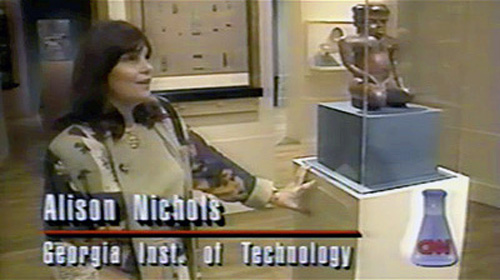
When the Carlos site launched, it was the third museum site on the web, following Krannert and Smithsonian. The launch drew the attention of CNN. Nichols work was featured on CNN’s science and technology Saturday program, and she was interviewed by Miles O’Brien, a popular news personality.
“It was all so new and novel that just the fact that you could get this image was enough. Nobody cared if you had to wait five minutes for it to download.”
She graduated in 1995 with LMC's first class of Digital Media master’s students. In the year after graduation, Nichols helped launch 70 small art museum websites for the New York-based Association of Art Museum Directors before joining IBM’s Interactive Media studio in Atlanta as one of its first information architects. She credits her digital media training for enabling her to move the conversation away from simply designing a visually beautiful site to designing one that is also functional for users.
Her time at IBM connected her with a range of clients, taking her from the hectic, noisy floor of the New York Stock Exchange to the still, silent stacks of the Vatican library. She worked there for more than a dozen years, eventually managing up to 40 people including a number of LMC Digital Media alums.
Her continued connections to Digital Media grads kept her aware of the program’s growth. She found she just couldn’t stay away. In the fall of 2012, Nichols began work as the associate director of the LMC Graduate Program in Digital Media – the same degree program that selected her to be one of its inaugural graduates twenty years ago.
“There’s so much talent and creativity here,” said Nichols, noting that DM graduates are well-rounded and faculty are supportive of students wishing to explore a diversity of interests, no matter how arcane. In February she returns to IBM Interactive as a managing consultant, working to recruit and mentor students.
“All that helps me see the bigger picture, the value of working collaboratively, and the attitude that if I don't do it, who will?” said Nichols of her laundry list of digital firsts stemming from her time at Tech. “It's better to move forward and do the best you can with what is known at the moment than wait for all the i's to be dotted.”
Or for the mummy to be unwrapped.
Related Links:
|
More IAC Alumni in the News
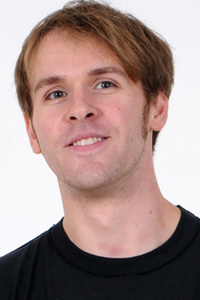 Ivan Allen College alums, both majors in Science, Technology, and Culture, were making news this month. One has received kudos from The New York Times, another has filmed a commercial that may be shown at the Super Bowl. It's all in a day's work for an IAC grad! Ivan Allen College alums, both majors in Science, Technology, and Culture, were making news this month. One has received kudos from The New York Times, another has filmed a commercial that may be shown at the Super Bowl. It's all in a day's work for an IAC grad!
Atlanta author Blake Butler was once a computer science major at Georgia Tech. He received a David Foster Wallace book one Christmas and was blown away with the prose. “I didn’t know fiction did those things,” he said. “That was like the high watermark of what I’d found. After I read it, I just started writing voraciously." He also switched his major to "the most liberal arts degree he could find at Tech:" Science, Technology, and Culture. Blake has since written half a dozen books and had his work reviewed in The New York Times, TIME, and Publisher’s Weekly. Read his profile.
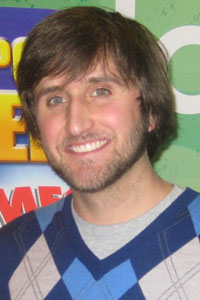 Ben Callner is hedging his bets on a goat. The Science, Technology, and Culture alum is the only non-Californian finalist in Doritos/Frito-Lay’s “Crash the Super Bowl” filmmaking competition. Two winners will receive a chance to have their commercial shown during the Super Bowl. One spot will be chosen by Doritos, and the other by public vote on February 4. Visit the site. Ben Callner is hedging his bets on a goat. The Science, Technology, and Culture alum is the only non-Californian finalist in Doritos/Frito-Lay’s “Crash the Super Bowl” filmmaking competition. Two winners will receive a chance to have their commercial shown during the Super Bowl. One spot will be chosen by Doritos, and the other by public vote on February 4. Visit the site.
|

|
Economics Students Present Impact Analysis of $20 Million Aerospace Investment to State Legislature
In February of 2011, Governor Nathan Deal announced a nearly $20 million expansion of Pratt and Whitney’s Columbus Engine Center in Columbus, Georgia. Two IAC economics majors have researched the impact of that expansion and presented their research to the Georgia State Legislature on January 15.
Majority Leader Larry O’Neal requested that members of the House Economic Development Committee, the Special Committee on Small Business Development and Job Creation, and the Ways and Means Committee attend a presentation of research findings by Mark Williams and Christopher Taylor, students in the School of Economics.
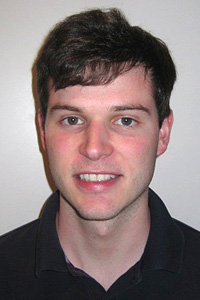
Williams (pictured, left) and Taylor spent their senior capstone course under Professor Christine Ries, researching the Pratt and Whitney investment. The company spent $19.3 million on an expansion to retrofit a building, install new equipment, and overhaul the engine for the F177―the power plant for the C-17 Globemaster III military cargo aircraft.
About 180 new manufacturing jobswill be added to the 300 already employed at the center. The investment is expected to enhance Georgia’s leadership in aerospace.
The key step of the students’ analysis was the assignment of an NAICS code to represent the industry characteristics of the Pratt and Whitney expansion. The company represents a service more than a manufacturing operation.
Williams and Taylor compared the analytical results achieved using different and various NAICS codes and compared these to their fuller understanding of the Pratt and Whitney business for this particular operation. In the end, their analysis is a much more accurate projection of the impact of the expansion on Georgia. Their work provides, through use of a complex and important industrial example, an important lesson in the use of economic impact analysis for public policy interpretation and use.
|
Schnepp Joins IAC Development
IAC welcomes Meredith Schnepp as a development associate for both the college and The Sam Nunn School of International Affairs. Schnepp comes to IAC from a position as development manager for the Atlanta Symphony Orchestra, Woordruff Arts Center.
“Meredith brings to bear a liberal arts background and significant experience in fundraising, program and board development, research and data analytics,” said IAC Development Director Juan McGruder. “I believe that our faculty, staff, alumni, and friends of the college will find her to be a knowledgeable resource.”
Schnepp is an Atlanta native and the daughter of a Georgia Tech alumnus. She holds a Bachelor of Arts degree in music from Mercer University.
|
|










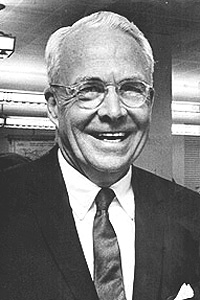

 Tech has designated January 10-26 as the period for honoring the life and legacy of Dr. Martin Luther King, Jr. with an interesting array of activities and collaborations. In doing so, we invite bold reflection among our community—and raise the challenge of how and why both the dream and the journey must continue.
Tech has designated January 10-26 as the period for honoring the life and legacy of Dr. Martin Luther King, Jr. with an interesting array of activities and collaborations. In doing so, we invite bold reflection among our community—and raise the challenge of how and why both the dream and the journey must continue.



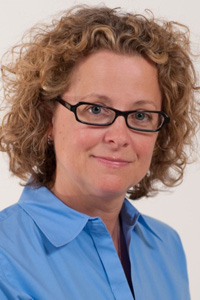
 This emerging integration will be the focus at the second Computation + Journalism symposium, which runs from January 31 to February 1 at Georgia Tech. The symposium will bring together speakers from academia and journalism to discuss how computation has affected the world of news and its direction for the future. Topics will include how to incorporate big data into the process of journalism, new methods for distributing news, and the use of social media in news gathering. View details
This emerging integration will be the focus at the second Computation + Journalism symposium, which runs from January 31 to February 1 at Georgia Tech. The symposium will bring together speakers from academia and journalism to discuss how computation has affected the world of news and its direction for the future. Topics will include how to incorporate big data into the process of journalism, new methods for distributing news, and the use of social media in news gathering. View details  The Ivan Allen College Graduate Student Advisory Board has worked with the Georgia Tech Graduate Student Association to plan a conference as part of the upcoming Georgia Tech Research and Innovation Conference (GTRIC) on Tuesday, February 12, 2013 in the Student Center. Graduate students in our liberal arts disciplines wanted the option to present papers based on their research. Such presentations are the dominant mode of initially disseminating research in the humanities and social sciences, and graduate students will now be able to share and hear research from their peers in different Ivan Allen schools. The GTRIC poster display will be located in the ballroom, while the conference will run from 12:00pm to 6:00pm and take place in SC 301 and SC 319, third floor breakout rooms of the Student Center. In addition to viewing the posters, the Georgia Tech community is invited to attend the GTRIC graduate student presentations. At 7:00pm on February 12, 2013, Ivan Allen College will present prizes to the top three conference papers as part of the GTRIC awards ceremony, which will be held in the Ferst Center Theatre. A program for the Ivan Allen College of Liberal Arts GTRIC conference is available
The Ivan Allen College Graduate Student Advisory Board has worked with the Georgia Tech Graduate Student Association to plan a conference as part of the upcoming Georgia Tech Research and Innovation Conference (GTRIC) on Tuesday, February 12, 2013 in the Student Center. Graduate students in our liberal arts disciplines wanted the option to present papers based on their research. Such presentations are the dominant mode of initially disseminating research in the humanities and social sciences, and graduate students will now be able to share and hear research from their peers in different Ivan Allen schools. The GTRIC poster display will be located in the ballroom, while the conference will run from 12:00pm to 6:00pm and take place in SC 301 and SC 319, third floor breakout rooms of the Student Center. In addition to viewing the posters, the Georgia Tech community is invited to attend the GTRIC graduate student presentations. At 7:00pm on February 12, 2013, Ivan Allen College will present prizes to the top three conference papers as part of the GTRIC awards ceremony, which will be held in the Ferst Center Theatre. A program for the Ivan Allen College of Liberal Arts GTRIC conference is available 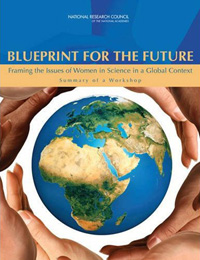

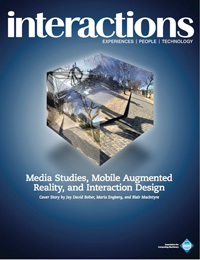
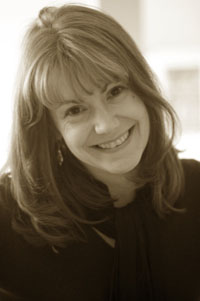
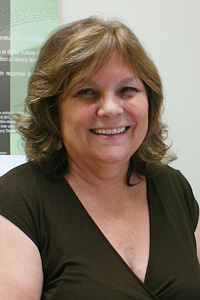

 Ivan Allen College alums, both majors in Science, Technology, and Culture, were making news this month. One has received kudos from The New York Times, another has filmed a commercial that may be shown at the Super Bowl. It's all in a day's work for an IAC grad!
Ivan Allen College alums, both majors in Science, Technology, and Culture, were making news this month. One has received kudos from The New York Times, another has filmed a commercial that may be shown at the Super Bowl. It's all in a day's work for an IAC grad! Ben Callner is hedging his bets on a goat. The Science, Technology, and Culture alum is the only non-Californian finalist in Doritos/Frito-Lay’s “Crash the Super Bowl” filmmaking competition. Two winners will receive a chance to have their commercial shown during the Super Bowl. One spot will be chosen by Doritos, and the other by public vote on February 4.
Ben Callner is hedging his bets on a goat. The Science, Technology, and Culture alum is the only non-Californian finalist in Doritos/Frito-Lay’s “Crash the Super Bowl” filmmaking competition. Two winners will receive a chance to have their commercial shown during the Super Bowl. One spot will be chosen by Doritos, and the other by public vote on February 4. 

